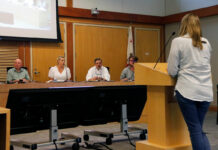Some time ago a column entitled “Religion challenges left and right” by E. J. Dionne, Jr. appeared in the Press Democrat. “Whenever I write sympathetically about religion,” he noted, “I get bombarded with tweets and notes from readers who normally agree with me but cannot abide by the idea that religious belief should be seen as intellectually serious.” Having made that caveat he goes on to treat religion seriously in a summary of a study produced by the Public Religion Research Institute and the Brookings Institution. Dionne himself took part in the research for the study. The study divides citizens into four groups: 28 percent religious conservatives, 38 percent religious moderates, 19 percent religious progressives, and 15 percent nonreligious. These groups are correlated to political attitudes and party affiliations. Not surprisingly, most religious conservatives are politically conservative and gravitate to the Republican Party, and most religious progressives and nonreligious are politically liberal and gravitate to the Democratic party. Also not surprisingly, religious moderates are in between and just as they are religiously moderate they tend to be moderate Republicans or moderate Democrats in fairly equal numbers.
The study goes into some detail about variations based on factors such as age and ethnicity. From all of this Dionne proposes that American religion poses challenges to both the political left and right. The challenge to the right is that many religious conservatives are progressives on issues such as health, welfare, minimum wage, and immigration, and, in fact, these social concerns are based very much on their conservative religious views. One challenge to the left is that two groups that have been very loyal to the Democratic party — Black Evangelicals and Hispanic Catholics — are uneasy with political policies that undermine their religious convictions about the sanctity of life and traditional marriage and family, and their pastors often urge them to vote for propositions and candidates that are pro-life and pro-traditional marriage and family. Another challenge to the left is the perception, perhaps mistaken, that in a nation in which a large majority of citizens identify themselves as religious in one way or another, the left appears to some to be anti-religious, for example the people on the left who tweet Dionne when he writes about religion in a sympathetic and serious way.
I am neither a Black Evangelical nor an Hispanic Catholic. I’m a white Anglican with conservative theological views. I grew up in a working class, union family. My parents were certainly loyal to the Democratic Party and so have I been. My dad said, go to church on Sunday, vote the Democratic ticket, and don’t cross picket lines. Nevertheless, I too feel increasingly uneasy about supporting a political party some of whose policies contradict deeply held religious convictions.
What follows is intended to be an intellectually serious explanation of my understanding of the relationship between three types of law: revealed, natural and positive. These concepts are based on the metaphysics of Aristotle as interpreted by St. Thomas Aquinas. The revealed law is, for Christians, found in the Holy Scriptures. The Ten Commandments (Exodus 20:1-17) are the foundation of the revealed law and the Sermon on the Mount (Matthew 5-7) is the pinnacle. The Holy Scriptures themselves teach that there is a natural law that can be known by observation and reason and which is consistent with the revealed law. St. Paul wrote, “What can be known about God is plain … Ever since the creation of the world (God’s) eternal power and divine nature…have been understood and seen through the things he has made.” (Romans 1:19) The revealed law is accessible to those who accept in the authority of Holy Scripture. The natural law is accessible to all, believers and non-believers, by means of, as noted above, observation and reason.
Christians have been subjects and citizens of empires, kingdoms, republics and democracies. Sometimes we have been persecuted, sometimes we have had a privileged position, sometimes, as in this nation, we are guaranteed the free exercise of religion. In all states, Christians believe that positive laws, that is, laws enacted by those in positions of civic authority, should embody the moral norms embodied in the revealed law and the natural law. In the United States many citizens do not acknowledge the authority of revealed law, and many would also deny that there is any such thing as natural law. They would say that there are only positive laws, enacted by human beings, and that these laws should reflect totally secular norms and mores.
Christian citizens of this nation, who recognize all three types of law — revealed, natural and positive — and who are also guaranteed the free exercise of religion, may and should use their votes to enact positive laws in accord with revelation and nature, and to amend or overturn positive laws that contradict revelation and nature. It is for this reason that I have voted for many progressive propositions regarding libraries, gun control, public safety, education and welfare; and for progressive candidates whose views on such issues I share. It is for this same reason that I have voted for the enactment of laws that uphold traditional marriage and family, and laws that protect human life, including the life of those not yet born. I would also note that many of us who are religious conservatives are actively involved in voluntary community service, locally and globally, based on our religious convictions.
I accept without reservation or resentment the fact that many of you, my fellow citizens, religious and nonreligious, may disagree with my conclusions about the nature and function of law. I ask only for a respectful hearing.
Canon Marvin Bowers is a retired clergyman and may be reached at fr************@***il.com.








